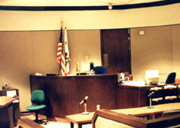|
|
|
State high court to review ruling on churches
Breaking Legal News |
2007/09/13 08:56
|
The California Supreme Court has voted unanimously to review a recent appeals court ruling that the Episcopal Diocese of Los Angeles is the owner of the buildings, prayer books and other property of several conservative congregations that broke away from the diocese in 2004. The court announced Tuesday that it would take up the closely watched case, which involves St. James Church in Newport Beach, All Saints in Long Beach and St. David's in North Hollywood. The three parishes had pulled out of the diocese and the national Episcopal Church because of differences over biblical authority and interpretation, including the Episcopal Church's decision in 2003 to consecrate an openly gay priest as bishop of New Hampshire.
The churches placed themselves under the authority of a conservative Anglican bishop in Uganda. The diocese sued, arguing that the congregations' property was held in trust for the diocese and the Episcopal Church as a whole.
Trial courts had ruled for the three parishes but in June, a panel of the 4th District Court of Appeal in Santa Ana reversed those decisions.
Diocesan attorney John R. Shiner said Tuesday he was confident that the state Supreme Court would affirm the appellate court's decision, which was unanimous.
Eric Sohlgren, lead attorney for St. James, said he was encouraged by the high court's decision to review the case, and said it could affect trial proceedings for other churches embroiled in similar property disputes.
"We think it's an important step toward calming the legal turmoil created by the appellate court decision," Sohlgren said. |
|
|
|
|
|
|
Class action or a representative action is a form of lawsuit in which a large group of people collectively bring a claim to court and/or in which a class of defendants is being sued. This form of collective lawsuit originated in the United States and is still predominantly a U.S. phenomenon, at least the U.S. variant of it. In the United States federal courts, class actions are governed by Federal Rules of Civil Procedure Rule. Since 1938, many states have adopted rules similar to the FRCP. However, some states like California have civil procedure systems which deviate significantly from the federal rules; the California Codes provide for four separate types of class actions. As a result, there are two separate treatises devoted solely to the complex topic of California class actions. Some states, such as Virginia, do not provide for any class actions, while others, such as New York, limit the types of claims that may be brought as class actions. They can construct your law firm a brand new website and help you redesign your existing law firm site to secure your place in the internet. |
Law Firm Directory
|
|





